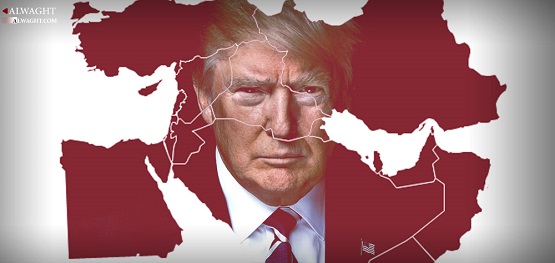
Several years after the Arab uprisings that began in 2011 and led to the start of the Islamic awakening period in the West Asia, the region is still engulfed by war and crisis, as if West Asia’s complicated puzzle of developments is yet to be solved on the regional and international levels.
In the past few critical years, some regional actors and some global powers have been trying hard to secure a key role in the course of field equations. The US is one of the players that since the eruption of the regional crises made moves to get involved in the conflict as a superpower, with a struggle to turn the tide to its own advantage. But as the time goes by, it becomes increasingly clear that Washingtonís dealing with the regional changes has suffered from a kind of confusion and political passivity which is largely reflected by President Donald Trump’s contradictory remarks and the inconsistency hitting various apparatuses of the foreign policy.
Washington political passivity is a showcase of the US reception of the new regional conditions. But what are the causes of such bewilderment in the American policy-making apparatuses in their addressing of the West Asian circumstances? Four factors could be cited as standing behind this situation:
1. Trump’s erratic personality and political naivety
One of the issues blamed for instability of the US foreign policy in relation to the new West Asian conditions is the American president’s personality. Trump won the presidential election while having no political experience or holding any political administration posts. In addition to the naivety, Trump after taking the office at the White House showed that he has no stable personality. In the administration of the country, the president is ignorant of collective management and designing coherent strategies based on consultation with his advisors. Over a year of his presidency has been a scene to a serious foreign policy crisis due to his unstudied decisions and uncalculated remarks. Shaky and irrational approaches of Trump are seen as a key cause behind the American officialsí failure to adopt an obvious strategy to address the West Asian issues. This allows for the claim that the White House’s decision-making mechanism is currently hit by chaos.
2. Regional resistance growing amid nationsí increasing awakening
Another factor prompting the US failures in the region is the increased role of the Axis of Resistanceís states in the new geopolitical conditions. Another factor is the growing awareness of the regional public of the destructive role of the Americans who destabilize West Asia in service of their own interests and policies. The Arab revolutions overthrew a number of West-reliant and allied dictatorships. The independence and justice-seeking movements wanted fundamental changes to their countriesí foreign policy, putting at stake the American interests in the region. Reacting to popular movements, the US staged a campaign of supporting its allies.
Evidence and reports increasingly highlight the Western and Israeli intelligence agenciesí role in the establishment of ISIS terrorist group which in the past four years inflicted heavy damages on the region after its emergence in Syria, Iraq, and other states. The main aim behind the creation of ISIS was to fuel ethno-sectarian conflicts that would give the West the necessary excuse to return to the region militarily under the ruse of terrorism. All these issues awaken the regional public and make them convinced that Washington’s exploitationist approaches do not seek to guarantee peace and interests of regional nations. Rather, they are meant to loot their natural wealth and destroy their culture. Such a popular conviction powered resistance to the American excesses in the past years, with the consequent outcome being the incapacitation of the US agenda for the region.
3. Russia’s powerful field involvement in Wes Asia
The US inability in the materialization of its designs for the region is also caused by the Russian concrete involvement in the regional developments, particularly the crisis in Syria. In the past, the US was the sole power taking advantage of its military might for its own and alliesí interests. But now the region is observing Moscow’s military presence which sets up serious roadblocks ahead of the US motion towards its goals. Russia has troops and cutting-edge weapons in Syria with strong deterrence that makes it hard for the Americans to manage the course of equations in accordance with their own desire. Many experts believe that the US at the present time is short of a clear strategy for confronting Russia in West Asia.
4. Troubles and pressures from US regional allies
The US perplexity in making certain decisions has another cause: the costly troubles made by its own regional allies. The Israeli pressure to relocate US embassy from Tel Aviv to Al-Quds (Jerusalem), Saudi-led diplomatic row with Qatari, the US army stay in Syria, Riyadh’s war against Yemen, and Arab regimesí tempting financial offers to Trump administration in return for expanding US interventions in the regional cases all put Washington in the middle of political crisis, and the exit from it requires paying the political and economic prices. Hardly struck by a sort of political paralysis that strips them of the power to make cohesive, game-changing decisions, the Americans have now cleared the scene in Syria, Iraq, Yemen, Afghanistan, and Lebanon for the play of the main regional rival Resistance camp.
LINK: https://www.ansarpress.com/english/9897
TAGS:






























 Violation of the sovereignty and rights of afghan citizens by America
Violation of the sovereignty and rights of afghan citizens by America




